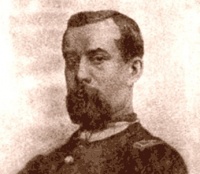George H. Felt: Difference between revisions
Pablo Sender (talk | contribs) No edit summary |
Pablo Sender (talk | contribs) No edit summary |
||
| Line 1: | Line 1: | ||
[[File:George H. Felt.jpg|right|200px]] | [[File:George H. Felt.jpg|right|200px]] | ||
'''George Henry Felt''' (born on [[September 21]], 1831 in | '''George Henry Felt''' ([[September 21]], 1831 - [[December 9]], 1906) was engineer, architect, and Egyptologist, and one of the [[Founders]] of the [[Theosophical Society]]. | ||
== Life == | |||
George Felt was born on [[September 21]], 1831 in Boston, Massachusetts, and married in New York Mary Anne Frain on [[September 23]], 1854. He was a mechanical engineer, and during his participation in the Civil War he invented a flare for military communication operations and a detonator.<ref>[http://www.civilwarsignals.org/brown/signalmen/464/georgehfelt.pdf George Henry Felt] at Signal Corps Association website</ref> | |||
He died on [[December 9]], 1906, though some sources say 1895. | |||
== Theosophical involvement == | |||
Mr. Felt claimed to have discovered how Egyptian priests invoked and commanded the [[Elemental|spirits of the elements]]. He declared he was able to demonstrate this, rendering them visible. On [[September 7]], 1875, he gave a lecture at [[Helena Petrovna Blavatsky|Mme. Blavatsky]]'s rooms on the subject "The Lost Canon of Proportion of the Egyptians, Greeks and Romans." About 17 people were present. During the discussion that followed a suggestion was made that a Society be formed to pursue and promote such occult research. | |||
The next day there was another meeting at H.P.B.'s place, [[The Lamasery]], in which Mr. Felt lectured again. During this meeting the idea of a Society was more definitely developed, [[Founders|sixteen people]] handing in their names for that purpose. A committee of three was appointed to draft a Constitution and Bylaws. | The next day there was another meeting at H.P.B.'s place, [[The Lamasery]], in which Mr. Felt lectured again. During this meeting the idea of a Society was more definitely developed, [[Founders|sixteen people]] handing in their names for that purpose. A committee of three was appointed to draft a Constitution and Bylaws. | ||
A third lecture was given by him on [[September 13]] at the same place, and during this meeting the name of the [[Theosophical Society]] was agreed upon. | A third lecture was given by him on [[September 13]] at the same place, and during this meeting the name of the [[Theosophical Society]] was agreed upon. | ||
Mr. Felt was elected as Vice-President of the Society, but failed to keep his promise. In [[Henry Steel Olcott|Col. Olcott]]'s words, "he never showed us so much as the wag of the tail of a vanishing elemental".<ref>[http://www.blavatskyarchives.com/olcott1890.htm# The First Leaf of T.S. History] by Henry S. Olcott</ref> | |||
According to historian [[Josephine Ransom]], "Felt drifted out of The Society. He was in England in 1877 and proposed the formation of a Society for occult research, with himself as President. Nothing came of this proposal".<ref>Josephine Ransom, ''A Short History of The Theosophical Society'' (Adyar, Madras, India: The Theosophical Publishing House, 1938), 111.</ref> | According to historian [[Josephine Ransom]], "Felt drifted out of The Society. He was in England in 1877 and proposed the formation of a Society for occult research, with himself as President. Nothing came of this proposal".<ref>Josephine Ransom, ''A Short History of The Theosophical Society'' (Adyar, Madras, India: The Theosophical Publishing House, 1938), 111.</ref> | ||
</blockquote> | </blockquote> | ||
== Notes == | == Notes == | ||
Revision as of 14:57, 24 September 2013
George Henry Felt (September 21, 1831 - December 9, 1906) was engineer, architect, and Egyptologist, and one of the Founders of the Theosophical Society.
Life
George Felt was born on September 21, 1831 in Boston, Massachusetts, and married in New York Mary Anne Frain on September 23, 1854. He was a mechanical engineer, and during his participation in the Civil War he invented a flare for military communication operations and a detonator.[1]
He died on December 9, 1906, though some sources say 1895.
Theosophical involvement
Mr. Felt claimed to have discovered how Egyptian priests invoked and commanded the spirits of the elements. He declared he was able to demonstrate this, rendering them visible. On September 7, 1875, he gave a lecture at Mme. Blavatsky's rooms on the subject "The Lost Canon of Proportion of the Egyptians, Greeks and Romans." About 17 people were present. During the discussion that followed a suggestion was made that a Society be formed to pursue and promote such occult research.
The next day there was another meeting at H.P.B.'s place, The Lamasery, in which Mr. Felt lectured again. During this meeting the idea of a Society was more definitely developed, sixteen people handing in their names for that purpose. A committee of three was appointed to draft a Constitution and Bylaws.
A third lecture was given by him on September 13 at the same place, and during this meeting the name of the Theosophical Society was agreed upon.
Mr. Felt was elected as Vice-President of the Society, but failed to keep his promise. In Col. Olcott's words, "he never showed us so much as the wag of the tail of a vanishing elemental".[2]
According to historian Josephine Ransom, "Felt drifted out of The Society. He was in England in 1877 and proposed the formation of a Society for occult research, with himself as President. Nothing came of this proposal".[3]
Notes
- ↑ George Henry Felt at Signal Corps Association website
- ↑ The First Leaf of T.S. History by Henry S. Olcott
- ↑ Josephine Ransom, A Short History of The Theosophical Society (Adyar, Madras, India: The Theosophical Publishing House, 1938), 111.
